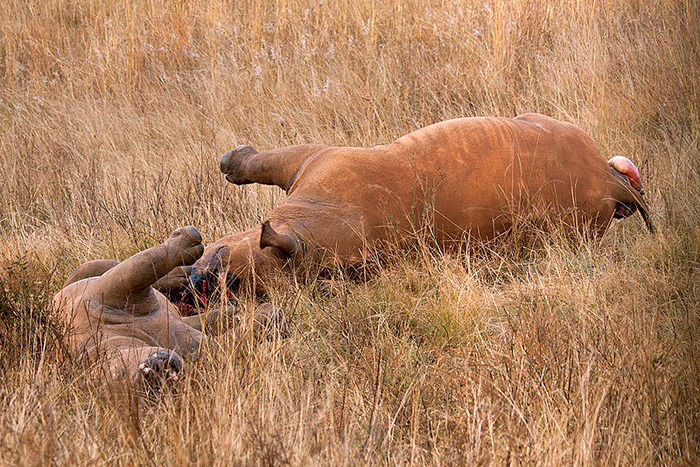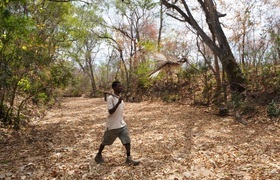People and wildlife: a status report
20 May 2015 | Story by Newsroom
Director of UCT's Centre of Criminology, Prof Mark Shaw, gives an overview of the first day of discussions at the Wildlife in Crisis conference, looking at all possible responses involving people and their interactions with wildlife.
The challenges of ending poaching in the Kruger Park were clearly laid out on the first night of the Centre of Criminology's series on Wildlife in Crisis. Johan Jooste, the head of anti-poaching operations in the park, described a situation in which there were three incursions by poacher groups every day and twelve poaching groups in the park at any one time. Armed clashes between rangers and poaching groups occurred weekly, with an estimated 4 300 poachers having entered the park in 2014.
When questioned as to whether SANParks' response was leading to a "militarisation of the park" including the use of language around the "neutralisation" of poachers, Jooste's response was unequivocal: if anyone has a better idea at the moment as to what to do, they should put it forward. Right now, however, the main task was to protect the remaining rhino.
Jooste was also clear that the fight could not be won in Kruger. What was required was a wider and holistic response, including better law enforcement responses to the sophisticated criminal networks that now drive the wildlife trade. There had been, he argued, good progress in Mozambique in the past number of months, but there remained much to do.
Corruption was a central challenge: new measures were being implemented including the 'truth testing' of rangers and managers at Kruger.
Moshakge Molokwane, national secretary of People and Parks argued that communities surrounding the protected wildlife areas needed a stake in the management of the parks if they were to be partners in stemming wildlife trafficking. He said that while those who were wealthy could hunt for "entertainment", ordinary poor people poached as a survival strategy or as "an act of defiance". Meeting the needs of poor communities living around the parks was therefore also a key strategy to counter poaching.
The complexity of responding to demand in Asia for rhino horn and ivory was outlined by Tess Rayner from the organisation Traffic. She concluded that changing behaviours was an enormous challenge and central to any strategy was to "make people think that they themselves had made the change." Change could not be imposed: people had to be included. It was not clear, however, given the current rate of poaching, whether there was time for demand-reduction initiatives to bear fruit.
The British High Commissioner to South Africa, Judith McGregor, outlined what her government, for its part, was trying to do stem illicit trade in wildlife products. A high-level meeting in London in 2014 had been followed by another in early 2015 in Kasane. There was progress, but bringing different country representatives together was always a complex process, and it required political will to make a difference. The Kasane meeting would be followed by one in Vietnam, a major consumer country. This signalled a strong commitment to building an international partnership, but it would take time.
The question of the lack of time that South Africa has to stem poaching and the illicit trade in wildlife products, most notably rhino horn, remained a key question. One questioner argued that given the iconic state of the rhino that a "state of emergency" should be declared. That raised the issue of what more could be done and are we doing enough – and whether there was any consensus at all as to possible solutions.
|
UCT's Centre of Criminology together with the Global Initiative against Transnational Organised Crime and the Conservation Action Trust hosted Wildlife in Crisis, a series of expert lectures and discussions conducted over three evenings at UCT, from 18–20 May. Stay tuned for daily updates from the conference:Day 1: People and wildlife: a status report Day 2: Towards a solution Day 3: Enforcement and justice |
 This work is licensed under a Creative Commons Attribution-NoDerivatives 4.0 International License.
This work is licensed under a Creative Commons Attribution-NoDerivatives 4.0 International License.
Please view the republishing articles page for more information.










